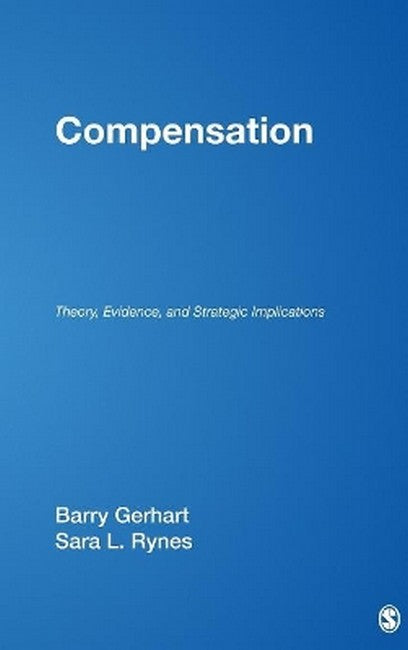Introduction to the Series - David A. Whetten Acknowledgments 1. Introduction: The Enigmas of Compensation Objectives Outline of the Book 2. Differences in Pay Level: Why Do Some Companies Pay More Than Others? A Tale of Two Markets The Case for Limited Discretion: Neoclassical Economic Theory Post-Institutional Economics: Theory Meets Reality Why It May "Pay" to Pay More The International Dimension Differences in Pay Levels for Particular Jobs Research on Pay Level Decision Making Summary Resource 2.1 3. Effects of Pay Level: What Do Employers Get in Return for Higher Pay? Theories of the Importance of Pay to Individuals What Do Employers Get in Return for Higher Pay Levels? Future Research 4. Pay Structure: Relative Pay Within Organizations The Role of Jobs and Job Evaluation in Pay Structure Theories of Differences in Pay Structure Work-Life Incentives Empirical Research on the Effects of Pay Structure Future Research 5. Pay Basis: Theories of Motivation and Pay for Performance Effects of Pay and Motivational Programs on Performance: Meta-Analytic Results Theories of Pay-Performance Relationships Psychological Versus Economic Perspectives Workforce Composition, Sorting, and Personality-Based Theories Future Research 6. Pay-for-Performance Programs: Empirical Evidence Broad Policy Decisions Putting It All Together: Empirical Evidence on Pay Programs Summary Future Research 7. Pay Strategy Strategic Fit and Alignment Beyond Generic Strategies: The Resource-Based View of the Firm Beyond Direct Earnings: Total Rewards Summary and Future Research 8. Toward the Future Future Research Methodological Recommendations References Index About the Authors
Request Academic Copy
Please copy the ISBN for submitting review copy form
Description
"Gerhart and Rynes provide a thorough, comprehensive review of the vast literatures relevant to compensation. Their insights regarding the integration of economic, psychological, and management perspectives are particularly enlightening. This text provides an invaluable tool for those interested in advancing our understanding of compensation practices." -- Alison E. Barber "The authors artfully synthesize complex scholarly articles from economics, psychology, and sociology. The organization of the book is exceptionally transparent... Compensation should be accessible to a wide range of readers who appreciate a multidisciplinary perspective on organizational issues... I cannot emphasize enough how effectively Gerhart and Rynes discuss compensation thoughout this book. As an experienced academic researcher, I have already benefited tremendously from my first reading of the book . It is a must-read, and I recommend it without reservation to instructors, researchers, and students." -- Joe Martocchio "Compensation is an excellent review of the current state of employee compensation... It is an excellent way to stimulate the thinking of those involved in research on organizational reward systems and should be required widely of doctoral students and others with a research interest in the topic... One of the strongest features of this book is its clear theoretical orientation to the topics covered. What's more, the text is not so much an introduction to those theories as a way of challenging the reader to think through implications on a bit more sophisticated level... The book is an excellent reference work for researchers and advanced students." -- PERSONNEL PSYCHOLOGY

